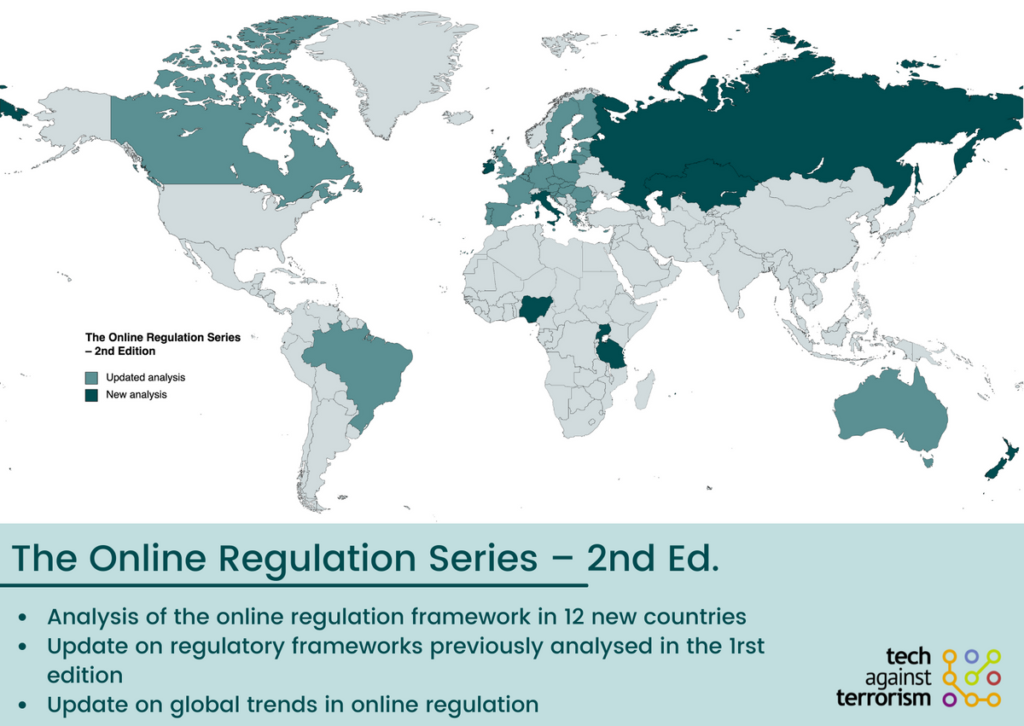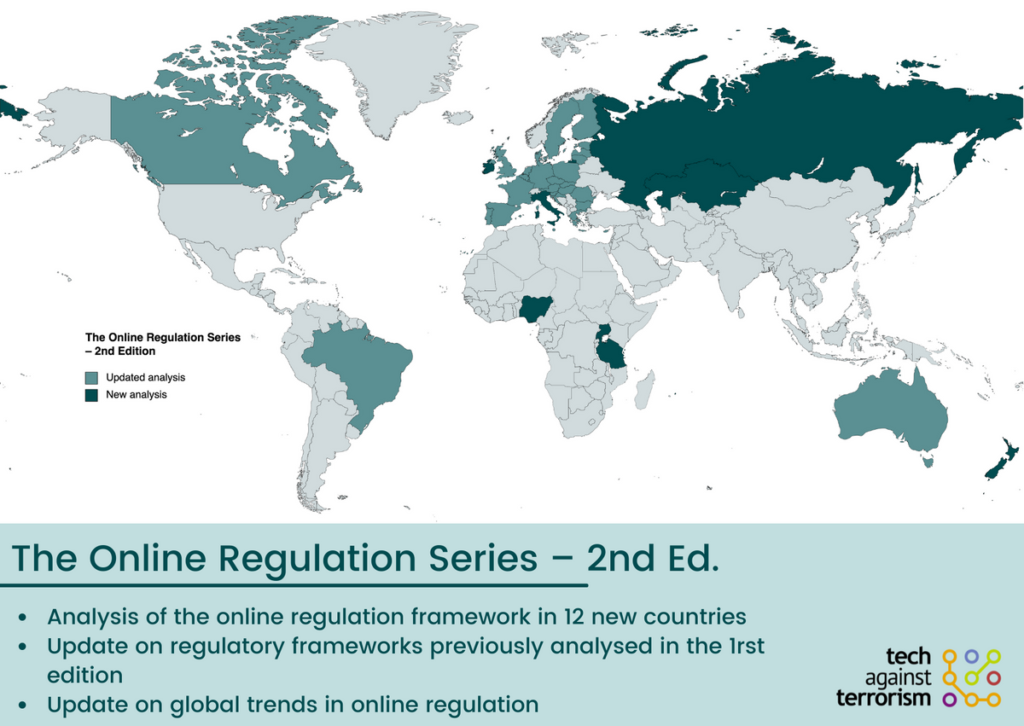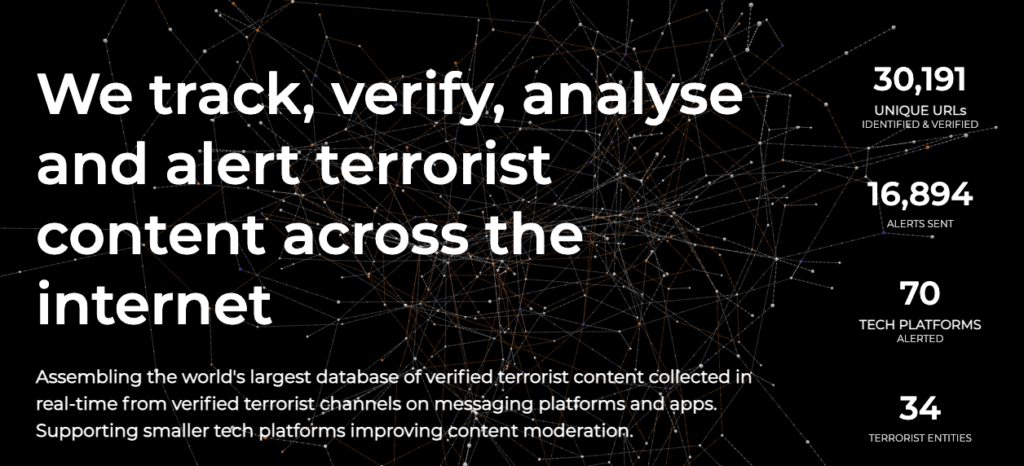Reader's Digest – 12 November 2021
Our weekly review of articles on terrorist and violent extremist use of the internet, counterterrorism, digital rights, and tech policy.
Webinar Alert!
- On Tuesday, 23 November, we will be hosting our next webinar in partnership with the GIFCT, on “Countering terrorist use of the internet, moderating online content and safeguarding human rights”. You can register for the event here. Please stay tuned for upcoming agenda details.
Tech Against Terrorism Updates
- We have published our October edition of the monthly TCAP newsletter. Give it a read here!
- The Online Regulation Series (ORS) is back for a 2nd edition. From 15 November, the ORS will be back to provide an updated analysis of the state of global online regulation and of legal requirements for tech companies to counter terrorist and violent extremist content online. With this edition, we plan to cover 12 new countries, with a focus on Europe and Sub-Saharan Africa. Watch this space!
- To read all the country analysis of the 1st Edition of the ORS, please see our dedicated Online Regulation Series Handbook. With this Handbook, we provide a state of play of online regulation and share practical insights for tech companies to improve their understanding of the complex and fast changing global regulatory landscape.
- Our Handbook, launched in July 2021, provides insight and analysis of over 60 regulations and legislative proposals in 17 countries and includes our recommendations for policymakers. You can access the Handbook here.

Tech Against Terrorism Resource Spotlight
- We are excited to highlight our landmark report on terrorist use of end-to-end encryption (E2EE), which provides an in-depth examination of the risks related to terrorist and violent extremist abuse of E2EE services, outlining mitigation strategies for tech platforms and recommendations for policymakers and law enforcement.
- You can access the report here, and the executive summary of our findings, including our high-level recommendations, here.
Top Stories
- EDRi has published a guide to support Members of the European Parliament navigating the 2,297 amendments made by various committees for the Digital Services Act.
- Google has commented on Canada’s plan to counter extremist and hateful content via its proposal for a legislation on countering harmful content on online communication services. Google has notable warned that Canada's plan was ‘vulnerable to abuse.’ An update to our Online Regulation Series analysis of Canada’s (pp. 123 - 137 of the Handbook) regulatory framework is planned for the 2nd edition of the ORS, watch out for the updated blogpost.
- Facebook has removed a post by the Ethiopian PM, Abiy Ahmed, for ‘inciting violence’ when he vowed to “bury” his government’s enemies in a Facebook post on Sunday. Twitter also marked the same tweet "abusive behaviour."
- Europol and the European Commission hosted a tabletop exercise sought to test the implementation of the EU Crisis Protocol. This involved testing real-time communication between governments and tech companies, as well as the interaction of processes when more than one crisis mechanism is initiated.
- The attacker suspected of the June killing of a Muslim family in London, Nathanial Veltman, was reportedly inspired by New Zealand mosque shooter, sources say. Written materials found at the attacker’s home allegedly show he was a follower of the Christchurch attack perpetrator.
The Terrorist Content Analytics Platform (TCAP) supports the Christchurch Call to Action, alerting material directly produced by the attacker to tech companies.
Tech Policy
- On online content, London tries to out-regulate Brussels: Annabelle Dickson and Clothilde Goujard discuss how the UK and the EU are competing to develop content regulation rules, with experts lamenting the lack of cooperation. Whilst both the UK’s Online Safety Bill (OSB) and the EU’s Digital Services Act (DSA) are pressing for more obligations on platforms to detect and remove illegal content, the OSB has gone a step further by requiring platforms to target content that is legal but harmful. The authors argue that despite a UK delegation recently visiting Brussels to compare the bills, the relationship remains tense rather than cooperative. With both bills likely to be finalised around the same time, freedom of speech advocates have argued the DSA would provide a “stronger” role model for the rest of the world. (Dickson and Goujard, Politico, 08.11.21)
To read more about the OSB, our Online Regulation Series Handbook includes an entry dedicated to the regulatory framework in the UK (p.107-116).
To read Tech Against Terrorism’s statement on the bill, see here.
To read our response to the public consultation on the bill, see here.
For any questions, please get in touch via:
contact@techagainstterrorism.org


